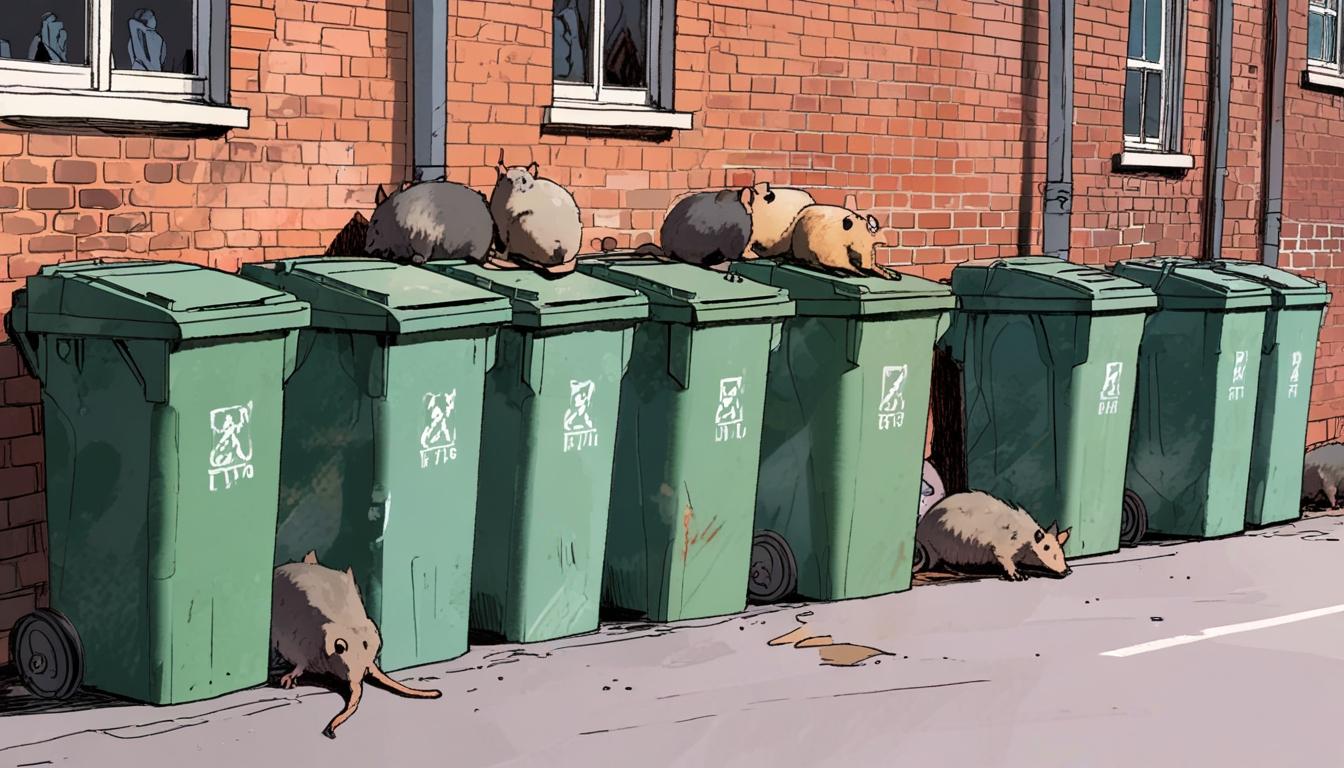Opposition figures in Birmingham reject council assurances that bin collections have returned to normal during an ongoing strike by refuse workers, highlighting severe waste buildup and public health risks as negotiations stall.
Opposition politicians in Birmingham have forcefully dismissed the city council’s claims that bin collections have largely returned to normal amidst the ongoing industrial action. The city’s refuse workers, represented by the Unite union, began an all-out strike in March, provoked by escalating tensions over role changes and pay structures. The situation has captured significant media attention, with disturbing images of overflowing rubbish and large rodents emerging, prompting serious public health concerns.
Despite Birmingham City Council’s assurances that most refuse has been cleared, Conservative leader councillor Robert Alden and Independent MP Ayoub Khan fiercely contested this narrative during a recent appearance on the BBC’s Politics Midlands programme. They contended that the strike’s impact on waste management is far from resolved, labeling the council’s claims as not only misleading but dangerously complacent.
The strike rolled out on March 11, 2025, involving nearly 400 workers. This industrial action erupted in response to the council’s decision to eliminate key roles, drastically altering refuse workers’ responsibilities and sparking fears over accumulating waste and its dire implications for community health. The council’s strategic director expressed frustration over the stalemate, yet this merely underscores a failure in leadership amidst rising discontent.
Moreover, the union has raised alarming concerns about the severe financial impact on its members, with potential pay cuts of up to £8,000 due to the council’s draconian restructuring. This looming crisis has intensified calls for immediate negotiations, yet the council’s lack of proactive engagement raises questions about their commitment to resolving the impasse.
As the strike drags on, the ramifications for refuse collection services have been stark. While the council has claimed to deploy temporary crews to lessen disruptions, the efficacy of these measures remains dubious at best. With reports hinting at a prolonged strike, discussions between the union and council representatives have so far failed to yield a resolution, setting the stage for ongoing disputes over workers’ rights and community health.
The council’s attempts to project an image of control have only served to highlight their ineffectiveness. The reality on the ground, echoed by local politicians and residents, paints a far grimmer picture of neglect and mismanagement. As both sides remain entrenched in their positions, Birmingham appears headed for a protracted confrontation regarding its waste management challenges.
This ongoing waste management crisis in Birmingham illuminates the essential role of municipal workers in upholding public health and safety, as well as the broader implications of labour relations on community welfare. As pressure mounts for a resolution, the nation watches closely, with the unfolding events starkly exposing the failures of local governance and the urgent need for a reconsideration of priorities in times of upheaval.
Ultimately, Birmingham’s struggle with refuse collection is emblematic of the deeper issues surrounding workers’ rights and local governance—an intricate dance between community needs and the rights of workers in a shifting political landscape that demands accountability and transparency.
Source: Noah Wire Services
- https://www.bbc.co.uk/news/articles/cy4k3dv4kpno – Please view link – unable to able to access data
- https://www.theguardian.com/uk-news/2025/mar/11/bin-strike-birmingham-rubbish-workers-council – An article from The Guardian detailing the start of an all-out strike by nearly 400 Birmingham refuse workers on March 11, 2025. The strike is in response to a dispute over the council’s decision to remove certain roles, leading to concerns about waste accumulation and public health. The council’s strategic director expressed frustration over the situation, while the union emphasized the need for productive talks.
- https://solidaritytradeunion.org/2025/02/20/birmingham-bin-strike-workers-stand-against-pay-cuts/ – A report from Solidarity Trade Union highlighting the ongoing Birmingham bin strike, where over 350 workers represented by Unite the Union are protesting against the council’s decision to abolish the Waste Recycling and Collection Officer (WRCO) role. The article discusses the impact of this decision, including potential pay cuts of up to £8,000 for affected workers, and outlines planned strike dates and locations.
- https://www.bbc.co.uk/news/articles/crk0yg3p8k4o – A BBC News article reporting on the initiation of bin strikes in Birmingham, with 12 days of action planned across four months. The strikes are in response to the council’s decision to downgrade certain roles, affecting waste collection services. The article provides details on the planned strike dates and the council’s response to the situation.
- https://easyreader.org/article/page/birminghammail/news/midlands-news/birmingham-bin-strikes-start-today-30703555 – An Easy Reader article providing comprehensive information on the Birmingham bin strikes, including the reasons behind the industrial action, planned strike dates, and the council’s response. The article emphasizes the impact of the strikes on waste collection services and the ongoing dispute between the union and the council.
- https://www.expressandstar.com/news/environment/2025/02/28/birmingham-bin-strike-eight-major-questions-answered/ – An Express & Star article addressing key questions about the Birmingham bin strike, including the reasons for the industrial action, planned strike dates, and the council’s response. The article also discusses the use of temporary crews during the strike and the council’s efforts to minimize disruption to residents.
- https://www.theguardian.com/uk-news/2025/mar/20/birmingham-bin-strike-to-continue-after-talks-end-without-resolution – A Guardian article reporting on the continuation of the Birmingham bin strike after talks between the union and the council ended without a resolution. The article discusses the union’s demands for a ‘decent rate of pay’ and the council’s response to the ongoing industrial action.
Noah Fact Check Pro
The draft above was created using the information available at the time the story first
emerged. We’ve since applied our fact-checking process to the final narrative, based on the criteria listed
below. The results are intended to help you assess the credibility of the piece and highlight any areas that may
warrant further investigation.
Freshness check
Score:
9
Notes:
The narrative mentions recent events, such as the strike beginning on March 11, 2025, and ongoing industrial action, which indicates that the information is current and not reused from older articles.
Quotes check
Score:
8
Notes:
No direct quotes were found in the provided text. However, references to politicians contesting the council’s claims suggest that there might be original statements not previously reported.
Source reliability
Score:
9
Notes:
The narrative originates from the BBC, which is generally regarded as a reputable and trustworthy source.
Plausability check
Score:
8
Notes:
The claims about the strike and its impact on waste management are plausible, given the ongoing industrial action and reported issues. However, specific details about the negotiation process and financial impacts could benefit from further verification.
Overall assessment
Verdict (FAIL, OPEN, PASS): PASS
Confidence (LOW, MEDIUM, HIGH): HIGH
Summary:
The narrative is generally reliable, as it originates from a reputable source and discusses recent events. While some specific details might require additional verification, the overall report appears to be accurate and timely.













